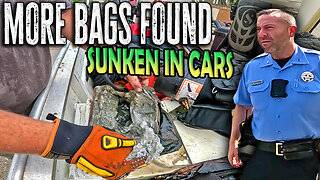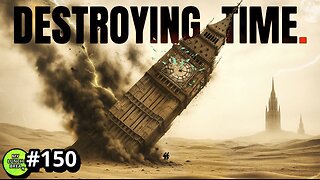Premium Only Content

Valley Girl Sabrina & Juxta re: Illumination of Human Augmentation Architecture
The Five Crime Families of New York were Military Intelligence Occult Operations:
All the families listed below were structured as Military Units which obey a Code of Conduct. Obedience, Omerta & World Mission aka: Honor, Code & Loyalty.
Bonnano Family
Columbo Family
Genevese Family
Gambino Family
Lucchese Family
The Chicago Outfit
Miami-Tampa-New Orleans Operations
Los Angeles-Hollywood-Las Vegas Operations
Arnold Rothstein (January 17, 1882 – November 6, 1928), nicknamed "The Brain", was an American racketeer, crime boss, businessman, and gambler who became a kingpin of the Jewish Mob in New York City. Rothstein was widely reputed to have organized corruption in professional athletics, including conspiring to fix the 1919 World Series. He was also a mentor of future crime bosses Lucky Luciano, Meyer Lansky, Frank Costello, Bugsy Siegel, and numerous others.
Charles "Lucky" Luciano; born Salvatore Lucania November 24, 1897 – January 26, 1962) was an Italian gangster who operated mainly in the United States. He started his criminal career in the Five Points Gang and was instrumental in the development of the National Crime Syndicate. Luciano is considered the father of the Italian-American Mafia for the establishment of the Commission in 1931, after he abolished the boss of bosses title held by Salvatore Maranzano following the Castellammarese War. He was also the first official boss of the modern Genovese crime family.
The Genovese crime family, also sometimes referred to as the Westside, is an Italian American Mafia crime family and one of the "Five Families" that dominate organized crime activities in New York City and New Jersey as part of the American Mafia. The Genovese family has generally maintained a varying degree of influence over many of the smaller mob families outside New York, including ties with the Philadelphia, Cleveland, Patriarca, and Buffalo crime families.
The Gambino crime family is an Italian American Mafia crime family and one of the "Five Families" that dominate organized crime activities in New York City, within the nationwide criminal phenomenon known as the American Mafia. The group, which went through five bosses between 1910 and 1957, is named after Carlo Gambino, boss of the family at the time of the McClellan hearings in 1963, when the structure of organized crime first gained public attention. The group's operations extend from New York and the eastern seaboard to California. Its illicit activities include labor and construction racketeering, gambling, loansharking, extortion, money laundering, prostitution, fraud, hijacking, and fencing.
The Lucchese crime family is an Italian American Mafia crime family and one of the "Five Families" that dominate organized crime activities in New York City and New Jersey, within the nationwide criminal phenomenon known as the American Mafia. Members refer to the organization as the Lucchese borgata; borgata (or brugard) is Mafia slang for criminal gang, which itself was derived from a Sicilian word meaning close-knit community. The members of other crime families sometimes refer to Lucchese family members as "Lukes".
The Colombo crime family is an Italian American Mafia crime family and the youngest of the "Five Families" that dominate organized crime activities in New York City within the criminal organization known as the American Mafia. It was during Lucky Luciano's organization of the American Mafia after the Castellammarese War, following the assassinations of "Joe the Boss" Masseria and Salvatore Maranzano, that the gang run by Joseph Profaci became recognized as the Profaci crime family.
The family was known as the Maranzano crime family until its founder Salvatore Maranzano was murdered in 1931. Joseph Bonanno was awarded most of Maranzano's operations when Charles "Lucky" Luciano oversaw the creation of the Commission to divide up criminal enterprises in New York City among the Five Families. Under the leadership of Bonanno between the 1930s and 1960s, the family was one of the most powerful in the country.
However, in the early 1960s, Joe Bonanno attempted to overthrow several leaders of the Commission but failed. Bonanno disappeared from 1964 to 1966, triggering an intra-family war colloquially referred to as the "Banana War" that lasted until 1968, when Bonanno retired to Arizona.
-
 28:37
28:37
marcushouse
1 day ago $10.17 earnedSpaceX Just Dropped the Biggest Starship Lander Update in Years! 🤯
32.3K14 -
 14:54
14:54
The Kevin Trudeau Show Limitless
3 days agoThe Hidden Force Running Your Life
118K27 -
 2:16:35
2:16:35
DLDAfterDark
12 hours ago $13.81 earnedIs The "SnapPocalypse" A Real Concern? Are You Prepared For SHTF? What Are Some Considerations?
34.1K14 -
 19:58
19:58
TampaAerialMedia
23 hours ago $10.52 earnedKEY LARGO - Florida Keys Part 1 - Snorkeling, Restaurants,
48.2K23 -
 1:23
1:23
Memology 101
2 days ago $10.22 earnedFar-left ghoul wants conservatives DEAD, warns Dems to get on board or THEY ARE NEXT
38K75 -
 3:27:27
3:27:27
SavageJayGatsby
13 hours ago🔥🌶️ Spicy Saturday – BITE Edition! 🌶️🔥
62.4K7 -
 26:09
26:09
Exploring With Nug
23 hours ago $12.98 earned13 Cold Cases in New Orleans What We Discovered Beneath the Surface!
56.7K28 -
 27:39
27:39
MYLUNCHBREAK CHANNEL PAGE
18 hours agoDestroying Time.
139K44 -
 3:27:19
3:27:19
Mally_Mouse
13 hours ago🌶️ 🥵Spicy BITE Saturday!! 🥵🌶️- Let's Play: Minecraft Christmas Adventure!!
136K13 -
 2:14:31
2:14:31
Side Scrollers Podcast
18 hours agoSide Scrollers INVITE ONLY - Live From Dreamhack
161K16